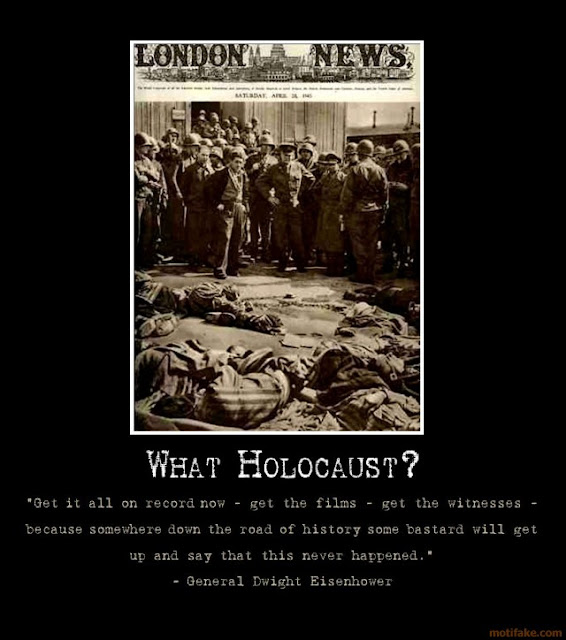Saturday, June 9, 2012
Changes in German Holocaust Education
Changes in German Holocaust Education. (INN).Manfred Gerstenfeld interviews Susanne Urban.“Germany erected many memorials and museums at former concentration camps, as well as for murdered Jews. The extent of the attention given to Holocaust education in schools and other educational institutions is outstanding. At the same time, one also observes an increasing self-perception of Germans as victims – because of the Allied bombings, the flight and expulsion from Eastern Europe and so on. Furthermore, prejudices such as ‘the Jews still make money off the Holocaust; they use the Holocaust against Germany and Europe for their own benefit,’ continue to float around.” Dr. Susanne Urban, an historian, is the Head of Historical Research in the International Tracing Service (ITS) in Bad Arolsen, Germany. Before that, she worked for five years at Yad Vashem.
Urban observes: “Anti-Semitism is currently found among 20% of the German population. Since the year 2000, anti-Semitic attitudes have often turned against the State of Israel and therefore contain both anti-Semitism and anti-Zionism. Successful Holocaust education is hampered when comparisons between the Warsaw Ghetto and the situation in Gaza or Israeli soldiers and Wehrmacht soldiers abound in media, in the public sphere and afterwards in schools. “
Colleagues told me about cases of students with migration backgrounds who left the classroom because the Holocaust was on the agenda.
Studies such as those by the Amadeo-Antonio-Foundation underline that these attitudes occur in the context of a self-perception which is often based on a confrontation between ‘us’ and ‘the West’ accompanied by a rejection against everything Jewish / Israeli – and therefore also against Holocaust education. “Educators should ask themselves: ‘How can we initiate an interest in the Holocaust for students not born in Germany or with a migration background?’ There are many angles through which educators may connect these students to the Holocaust. One way is through Muslim rescuers in Albania who saved nearly all of the Jews in the country. Another is through the experiences of North African Jews or Jews who found shelter in Turkey.
Another example comes from ITS documents: an Italian citizen – Muslim – fought with Italian partisans against the Nazis and was then registered as a Displaced Person in Italy. He didn’t want to live in Europe any more after what he had experienced during the German occupation. There is thus a connection between the Muslim world and the events between 1933 and 1945, both in examples of help and rescue but also on the other side – if one thinks about the Muslim SS-formations of Haj Amin al-Husseini – the Mufti of Jerusalem – who sent out his propaganda from Berlin. “The Holocaust was an event which crossed borders and went global. This demonstrates the fundamental recognition that history concerns human beings from various backgrounds, of differing religions and perspectives on the world. “Recent opinion polls show that even pedagogic students have only meager awareness about events such as Auschwitz and the Holocaust. In January 2012, the Stern magazine published its findings of a survey.
Ninety percent of Germans know about Auschwitz and were able to connect the name to the camp. Yet only 21% of those aged between 18 and 29 know about Auschwitz. A third of those interviewed didn’t know that Auschwitz is in Poland. Forty three percent have never visited a memorial site of a former concentration camp. “
On the positive side: in 1994, 53% in Germany longed to consider the Nazi-past and the Holocaust as history without actual importance. Today this number has dropped to 40%. This is probably related to the fact that the generation of bystanders, perpetrators and profiteers is dying out. But 40% is still a high number, as these people are not willing to share responsibility for remembrance and the legacy of the survivors. This also has to do with the fact that 65% emphasize that Germany does not carry any special responsibility toward other nations because of its history. This gets further relief if one considers the widespread anti-Israel attitude in the country. “A current lesson from history is that we have the responsibility not to be bystanders in other genocides. The world failed in Rwanda. In addition, the threats of genocide – such as those made by Iran against Israel — should not go unanswered.” Urban concludes: “There is an urgent need to clearly define the common goals of Holocaust education. It should give the victims their stories and history back. One should read and listen to their perspectives as a counterpart to the perpetrators’ views. Youngsters should learn to take responsibility for their own opinions and actions. The stories of Righteous Gentiles should be taught to demonstrate that one does have a choice and that life is not deterministic. All victims and survivors and all helpers and rescuers participated in European culture, enriched societies and contributed to their countries. At the ITS we have over 30 million documents. From them, one can learn to teach and find one’s way to be active, engaged and alert. Remembrance must be future-orientated, yet also be connected with responsibility for today.”Hmmmm........"He who passively accepts evil is as much involved in it as he who helps to perpetrate it. He who accepts evil without protesting against it is really cooperating with it." ~ Martin Luther King, Jr. Read the full story here.
Labels:
Antisemitism,
Holocaust,
Holocaust Denial,
Islam,
Islamic extremism.
Subscribe to:
Post Comments (Atom)


No comments:
Post a Comment